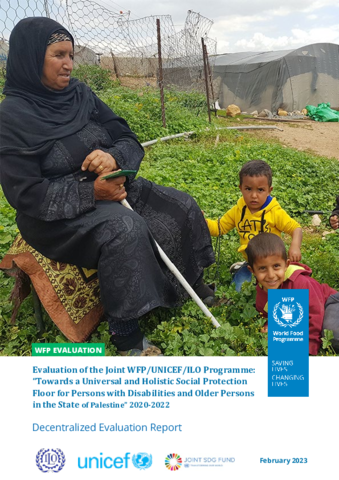
WFP, UNICEF, and ILO jointly commissioned an evaluation of their Joint Programme, “Towards a Universal and Holistic Social Protection Floor for Persons with Disabilities and Older Persons in the State of Palestine from 2020 to 2022”. It was carried out in 2022.
The evaluation aimed to assess the implementation of the Joint Programme and generate lessons for future initiatives. It focused on relevance, effectiveness, efficiency, and sustainability, and covered activities by all participating organizations and partners. The evaluation aimed to answer critical questions about the achieved and potential results of the joint programme, the cost-effectiveness of delivering these results, the programme’s alignment with the needs of the most vulnerable groups, its contribution to the UN reforms and the Sustainable Development Goals, and the likelihood of sustained benefits from the intervention.
Key evaluation findings included:
- The joint programme is relevant for the context in which it was designed and has been implemented effectively.
- The scale and scope of the joint programme are appropriate for the needs of Palestinians and contribute to enhancing social protection policies and systems that relate to people with disabilities and older persons.
- The areas that could be improved included coordination, gender, monitoring of outcomes, communication, and governance,
- Long-standing experience and flexibility resulted in cost-efficiency gains in delivering fitted activities. Despite this, the timely delivery of activities was set back due to a variety of internal and external factors, exacerbated by extraneous factors, such as COVID-19 and the May 2021 War on Gaza.
Key recommendations from the evaluation included
- The Regional Bureau should prioritize capturing and sharing valuable insights across similar contexts in the region, fostering the exchange of knowledge to enhance the quality of programming for the benefit of country offices.
- United Nations Organizations with support from RBs and headquarters (HQs) should continue to support the Government of Palestine in developing a holistic social protection system.
- Reinvesting in relationships with key partners is crucial and should be done where necessary.
- Future programme delivery should place greater emphasis on quality elements, including the appointment of a full-time coordinator and integration of specialists in gender, monitoring, and communication.
- The UN Country Team, Resident Coordinator, and other UN agencies in Palestine are requested to consider translating the lessons learned by this JP into collaborative initiatives on the ground, fostering synergies among UN actors.



